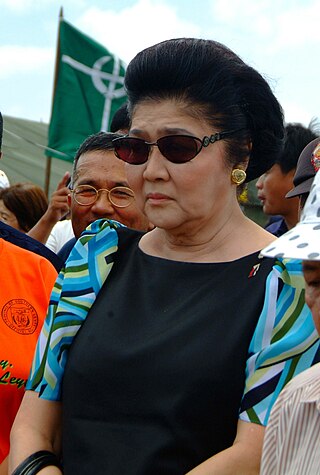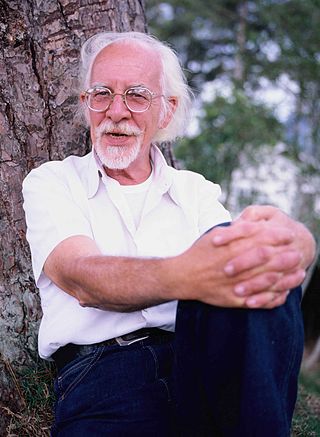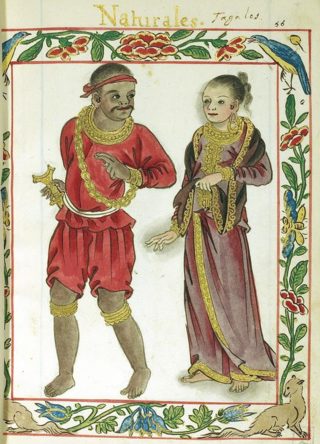Related Research Articles

Ilocos Norte, officially the Province of Ilocos Norte, is a province of the Philippines located in the Ilocos Region. Its capital is Laoag City, located in the northwest corner of Luzon Island, bordering Cagayan and Apayao to the east, and Abra to the southeast, and Ilocos Sur to the southwest. Ilocos Norte faces the West Philippine Sea to the west and the Luzon Strait to the north.

Imelda Romualdez Marcos is a Filipino politician who was First Lady of the Philippines from 1965 to 1986, wielding significant political power after her husband Ferdinand Marcos placed the country under martial law in September 1972. She is the mother of current president Bongbong Marcos.
Ninotchka Rosca is a Filipina feminist, author, journalist, and human rights activist. best known for her 1988 novel State of War and for her activism, especially during the Martial Law dictatorship of former Philippine President Ferdinand Marcos. Rosca has been described as "one of the major players in the saga of Filipina American writers."

The Catholic Church in the Philippines or the Filipino Catholic Church is part of the worldwide Catholic Church, under the spiritual direction of the Pope and the Catholic Bishops' Conference of the Philippines (CBCP). The Philippines is one of the two nations in Asia having a substantial portion of the population professing the Catholic faith, along with East Timor, and has the third largest Catholic population in the world after Brazil and Mexico. The episcopal conference responsible in governing the faith is the Catholic Bishops' Conference of the Philippines.

Clarita Reyes Carlos is a Filipino political scientist and commentator, academic, and educator who last served as the National Security Adviser under the administration of President Bongbong Marcos from 2022 to 2023. As National Security Adviser, she concurrently served as the Director-General of the National Security Council and Vice Chairperson of the Anti-Terrorism Council. She served as the 16th President of the National Defense College of the Philippines from 1998 to 2001, becoming the first female and first civilian to lead the institution.

William Henry Scott was a historian of the Cordillera Central and pre-Hispanic Philippines.

Ambeth R. Ocampo is a Filipino public historian, academic, cultural administrator, journalist, author, and independent curator. He is best known for his definitive writings about Philippines' national hero José Rizal and on topics on Philippine history and Philippine art through Looking Back, his bi-weekly editorial page column in the Philippine Daily Inquirer.

Agimat, also known as anting or folklorized as anting-anting, is a Filipino word for "amulet" or "charm". Anting-anting is also a Filipino system of magic and sorcery with special use of the above-mentioned talismans, amulets, and charms. Other general terms for agimat include virtud (Virtue) and galing (Prowess).

The known recorded history of the Philippines between 900 and 1565 begins with the creation of the Laguna Copperplate Inscription in 900 and ends with the beginning of Spanish colonization in 1565. The inscription records its date of creation in the year 822 of the Hindu Saka calendar, corresponding to 900 AD in the Gregorian calendar. Therefore, the recovery of this document marks the end of the prehistory of the Philippines at 900 AD. During this historical time period, the Philippine archipelago was home to numerous kingdoms and sultanates and was a part of the theorized Indosphere and Sinosphere.
Leticia Valdez Ramos-Shahani was a Filipina senator, diplomat, and writer.

In the Philippines, a baklâ, bayot (Cebuano) or agî (Hiligaynon) is a person who was assigned male at birth and has adopted a gender expression that is feminine. They are often considered a third gender. Many bakla are exclusively attracted to men and some identify as women. The polar opposite of the term in Philippine culture is tomboy, which refers to women with a masculine gender expression. The term is commonly incorrectly applied to trans women.
Filipino values are social constructs within Filipino culture which define that which is socially considered to be desirable. The Filipino value system describes "the commonly shared and traditionally established system of values underlying Filipino behavior" within the context of the larger Filipino cultural system. These relate to the unique assemblage of consistent ideologies, moral codes, ethical practices, etiquette and personal and cultural values that are promoted by Filipino society.

As in other Southeast Asian countries, deforestation in the Philippines is a major environmental issue. Over the course of the 20th century, the forest cover of the country dropped from 70 percent down to 20 percent. Based on an analysis of land use pattern maps and a road map an estimated 9.8 million hectares of forests were lost in the Philippines from 1934 to 1988.

Radio in the Philippines refers to radio programs, radio stations, and radio broadcasting organizations in the country. Estimates on the number or radio stations range from 1,200 to 1,500.
Billie Mary "Betty" Chua Go-Belmonte was a Filipina journalist and newspaper publisher. She established the STAR Group of Publications which publishes the national newspaper, The Philippine Star and The Freeman, the tabloids Pilipino Star Ngayon, Pang-Masa, and Banat, as well as the magazines Starweek, People Asia, and The Fookien Times Yearbook.
The historiography of early Philippine settlements is the academic discipline concerned with the studies, sources, critical methods and interpretations used by scholars to understand the history of settlements in early Philippine history. By modern definitions, this does not involve a story of "events in the past directly," but rather "the changing interpretations of those events in the works of individual historians."

The historiography of the Philippines includes historical and archival research and writing on the history of the Philippine archipelago including the islands of Luzon, Visayas, and Mindanao.
Florangel Rosario-Braid is a Filipina writer, educator, and constitutionalist, who was a member of the Philippine Constitutional Commission of 1986. She served as president and executive dean, currently president emeritus of the Asian Institute of Journalism and Communication (AIJC).
The Protestant and Catholic churches saw that the Lumad and Moro people were suffering and responded by contextualizing liberation theology into what would be called the Theology of Struggle. The theology of struggle was developed by the Christians for National Liberation. The Philippines was colonized by Spain, Japan, and the United States since the 1500s. The theology of struggle was started in the Catholic church as a way of protecting the impoverished from the Marcos regime. The Sisters of the Good Shepherd is a group of Filipino nuns living according to what they call a theology of struggle. The nuns live among the impoverished and work alongside them to build political power, which puts them at odds with the Catholic church and the Filipino government.
Isabelo F. "Bel" Magalit was a Filipino Evangelical pastor, theologian, and author known as one of the leading people of the Evangelical movement in the Philippines during the country's Martial Law era under President Ferdinand Marcos. Best known as pastor of Diliman Bible Church (DBC), he was also the first Filipino and Asian president of Asian Theological Seminary (ATS).
References
- ↑ Kwantes, Anne (2005). "Thinker, Writer, Christian Activist: Melba Padilla Maggay (1950— )". She Has Done a Beautiful Thing for Me: Portraits of Christian Women in Asia. PhilAm Books. pp. 293–216. ISBN 971-511-894-1.
- ↑ Hill, Graham (26 July 2017). "7 Inspiring Women: Melba Padilla Maggay – Graham Hill". The GlobalChurch Project. Retrieved 29 October 2020.
- ↑ Roldan, Andrea (18 March 2019). "The Gospel in the Filipino Context: José M. de Mesa and Melba P. Maggay". OMF. Retrieved 29 October 2020.
- ↑ "30th Annual William Menzies Lectureship Speaker - Asia Pacific Theological Seminary". 2022-10-23. Retrieved 2022-12-01.
- ↑ "[OPINION] Marcos and the Church". RAPPLER. 2022-01-23. Retrieved 2022-12-01.
- ↑ Mumper, Sharon E (1986-04-18). "A Peaceful Transition". Christianity Today. Retrieved 2022-12-01.
- ↑ Swartz, David (2019-07-31). "Filipino Evangelicals and People Power". Anxious Bench. Retrieved 2022-12-01.